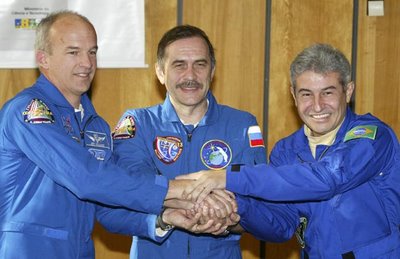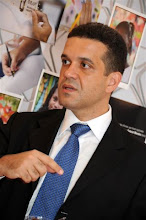Archive for March 2006
Pride in being Brazilian
 Brazilian astronaut Lt. Col. Marcio Cesar Pontes became Brazil's first person in space. He flied on a Russian Soyuz to the International Space Station.
Brazilian astronaut Lt. Col. Marcio Cesar Pontes became Brazil's first person in space. He flied on a Russian Soyuz to the International Space Station.Pontes began training in 1998 in the United States and was scheduled to fly to the space station aboard a U.S. space shuttle, but those plans were scrapped after the U.S. National Aeronautics and Space Administration suspended shuttle flights in the wake of the 2003 Columbia explosion.
Following the U.S. shuttle disaster, Brazil began discussions with Russia about the possibility of Pontes traveling aboard a Russian rocket.
During a November 2004 visit to Brazil, Russian President Vladimir Putin also agreed that Russia would help Brazil resume its space program and restore its rocket-launching base, which was destroyed by a rocket explosion in Alcantra Base Station on 2003 that killed 21 skilled technicians.
Brazil and Russia signed an agreement for the space mission during Brazilian President Luiz Inacio Lula da Silva's visit to Moscow last October 2005.
Marcio Pontes will held scientific experiments in International Space Station regarding to INPE space navigation systems and Embrapa biotechnology and food experiments on low gravity. Brazil is one of the 15 countries in the world with a complete space program from telecom research, satellite construction and navigation systems, rocket fuel and launch vehicles.
 From left, U.S. astronaut Col. Jeffrey Williams Russian cosmonaut Pavel Vinogradov and Brazilian astronaut Marcos Cesar Pontes, shake hands during a news conference at the training center in Star City outside, Moscow, Russia, Wednesday, Feb. 8, 2006. Credit: AP Photo/Misha Japaridze.
From left, U.S. astronaut Col. Jeffrey Williams Russian cosmonaut Pavel Vinogradov and Brazilian astronaut Marcos Cesar Pontes, shake hands during a news conference at the training center in Star City outside, Moscow, Russia, Wednesday, Feb. 8, 2006. Credit: AP Photo/Misha Japaridze.
Wednesday, March 29, 2006
Posted by Fabiano Gallindo
World design competition awards Brazilian products
 Nineteen products and 17 companies from Brazil were awarded prizes in the edition of the iF Product Design Award, most important design award in the world. Brazil competed with 156 projects. The prize giving ceremony happened last week, in Hanover, in Germany.
Nineteen products and 17 companies from Brazil were awarded prizes in the edition of the iF Product Design Award, most important design award in the world. Brazil competed with 156 projects. The prize giving ceremony happened last week, in Hanover, in Germany.The prizes acclaimed the work of designers and companies that had won in other editions, like Antonio Bernardo (jewellery), Fernando Prado/Lumini (lighting) and Filomena Padron/Natura (packaging). The information is from the Ministry of Development, Industry and Foreign Trade.
Sunday, March 26, 2006
Posted by Fabiano Gallindo
Flytex jumpsuits
 The garments that Brazilian astronaut Marcos César Pontes is going to wear during his trip to space on board of a Russian ship were made in São Paulo, SE Brazil. Two blue jumpsuits, two pairs of trousers, five polo shirts and a leather jacket are part of the baggage. The jumpsuits, which were made according to North American military norms, are already being worn by Pontes during his training.
The garments that Brazilian astronaut Marcos César Pontes is going to wear during his trip to space on board of a Russian ship were made in São Paulo, SE Brazil. Two blue jumpsuits, two pairs of trousers, five polo shirts and a leather jacket are part of the baggage. The jumpsuits, which were made according to North American military norms, are already being worn by Pontes during his training.The company from São Paulo that is responsible for his clothes is Flytex*, which is specialized in garments and accessories turned to aeronauts, policemen and professionals of other tactical activities. This is the first time that the company has made an astronaut jumpsuit. "I am very pleased with the story," stated Marília Fajardo Oliveira, who is responsible for production of the garments.
According to her, the first contact with the Brazilian Space Agency (AEB) took place in November last year, when a representative from the AEB saw a pilot wearing a jumpsuit made by Flytex at a shopping centre in Brazilian capital Brasília. "The first order they made was for the emblems to be stitched onto the jumpsuit," stated Marília, who made three emblems: the Brazilian flag, the symbol of the Brazilian Foreign Trade Association and of the Centenarian Mission, an honour to the first flight by Brazilian aviator Santos Dumont.
Flytex
Telephone: (+55 11) 3501 3380
Site: www.flytex.com.br
* Company Flytex, from the interior of the state of São Paulo, is specialized in uniforms for professionals like aeronauts and policemen. Flytex arose four years ago and produces around 500 items a month. Apart from the jumpsuits, trousers, polo shirts and jackets, the company produces waistcoats with pockets, bags for helmets and other accessories. Flytex garments may be found over the whole of the national territory.
Saturday, March 25, 2006
Posted by Fabiano Gallindo
Gold Wax and Honey
 Many of the beekeeping activities in developing countries in the past have been oriented towards honey production. Wax usually was a by-product and other possible products have rarely found consideration. Such neglect of other products has a variety of reasons among which an easily accessible market or the lack of knowledge about production and further use are of major importance. While production methods of other primary products can be adapted from common beekeeping texts, the further elaboration and use of the same products can rarely be found. If so, descriptions range from highly specific scientific results to self-proclaimed experts fraudulently exploiting consumer ignorance. In order to present a comprehensive and practical review this bulletin tries to synthesize available information from scientific literature and practical, technical literature including the few indepth reviews available on some of the primary bee products such as honey, Wax and propolis.
Many of the beekeeping activities in developing countries in the past have been oriented towards honey production. Wax usually was a by-product and other possible products have rarely found consideration. Such neglect of other products has a variety of reasons among which an easily accessible market or the lack of knowledge about production and further use are of major importance. While production methods of other primary products can be adapted from common beekeeping texts, the further elaboration and use of the same products can rarely be found. If so, descriptions range from highly specific scientific results to self-proclaimed experts fraudulently exploiting consumer ignorance. In order to present a comprehensive and practical review this bulletin tries to synthesize available information from scientific literature and practical, technical literature including the few indepth reviews available on some of the primary bee products such as honey, Wax and propolis.Brazil is the seventh largest producer and exporter of honey in the world (ANBA, 2005). This position was reached due to the quality and variety of the honey, mostly wild, and also to the space left open by China, which faced sales restrictions due to the use of pesticides in the production. With the return of the Chinese to the market, however, Brazil must go after new buyers so as to maintain foreign sales or add value to their products on the honey and wax manufacturing.
 Jose Vilane, commercial director of Apilani, tells the innumerable fruits that his company harvested and the possibilities of the innovation as way to gain better markets. Dedicating the beekeeping to it initially as occupational therapy, its family finished developing the first Brazilian electrical alveolador wax cylinder - in the occasion only six of them existed in Brazil , some already badly functioning . The machine, only manufactured in Germany before Apilani product, is strategical for this diverse market and was awardee times. Today, only Germany and Brazil dominate the process of manufacture of the cylinders, exported by the Apilani since 1991.
Jose Vilane, commercial director of Apilani, tells the innumerable fruits that his company harvested and the possibilities of the innovation as way to gain better markets. Dedicating the beekeeping to it initially as occupational therapy, its family finished developing the first Brazilian electrical alveolador wax cylinder - in the occasion only six of them existed in Brazil , some already badly functioning . The machine, only manufactured in Germany before Apilani product, is strategical for this diverse market and was awardee times. Today, only Germany and Brazil dominate the process of manufacture of the cylinders, exported by the Apilani since 1991.Brazilian exports of honey added up to US$ 10.8 million between the months of January and July of 2005. The state of Piauí, in the Northeast of the country, holds the second position for sales in the international market, with US$ 1.6 million. The first place was the state of São Paulo. According to estimates of the Brazilian Apiculture Confederation, Brazil owned, in January 2004, about 4 million beehives producing 33,000 tons of honey per year.
Saturday, March 18, 2006
Posted by Fabiano Gallindo
Early adopter attitude
 Brazilian Consumers Can Now Receive Calls To Their Own SkypeIn Number From Any Mobile Or Land Phone Through Transit Telecom’s Network.
Brazilian Consumers Can Now Receive Calls To Their Own SkypeIn Number From Any Mobile Or Land Phone Through Transit Telecom’s Network.Global Internet communication company Skype and telecommunications operator Transit Telecom announced a deal that will launch SkypeIn to the Brazilian market. SkypeIn beta is a new Skype offering in Brazil that allows users to have their own private number, provided by Transit Telecom, to receive inbound calls from traditional landline or mobile phones to Skype.
“Brazil in particular is a country known for its early adopter attitude towards new innovations. Today, it is one of the top five countries in the world communicating through Skype,” says Skype’s Vice President, Strategic Partners, Geoffrey Prentice.
The free voicemail that comes with SkypeIn allows customers to receive a voicemail message of up to 10 minutes from any user or traditional phone. Skype Voicemail customers may record their own personalized voicemail greeting, playback their messages (even while offline), and send incoming calls to voicemail if they’re away, offline or simply busy on another call.
* Transit Telecom was founded at the end of the 90's during the time of significant changes in Brazilian telecommunication. Today, the company helps to connect Brazil to the world through code 17 of the Brazilian telecom model. Transit Telecom has a whole range of solutions to the consumers and companies. Nowadays, Transit works with about 17 thousands households, and 38 thousands companies from South and Southwest regions, expanding to all Brazilian territory. Transit Telecom offers products like "Via VoIP", based on VoIP technology, and the "Transit Line" - a dedicated link to voice users.
Wednesday, March 15, 2006
Posted by Fabiano Gallindo
School of the Future LABITV
The LABITV is an Advanced Interactive Laboratory for Production in Multimedia: for TV Digital and Internet. The effective viabilization of the Advanced Laboratory of Interactive for Production in Multimedia: Digital TV and Internet implantation depends of the access to the high technologies and to the collective knowledge produced in USP will be a great benefit and impact to the Brazilian society, why not, to the world.
 The LABITV main objective is the research, the development, the production and the implementation of formats, interfaces and solutions for specific multimedia environment for learning and work.
The LABITV main objective is the research, the development, the production and the implementation of formats, interfaces and solutions for specific multimedia environment for learning and work.
For 12 years the new technologies of communication and information applied to education consist on the focus work of the USP School of the Future. With the crescent worldwide presence of Interactive TV, we met attracted by this new possibility that converge various communication ways present in our day-by-day activities.
This project will be more interesting, as much entities, nucleus or groups participate. For more information, contact thais@futuro.usp.br.
*The School of the Future of the University of São Paulo, is an interdisciplinary laboratory investigating the impact of the new communications technologies on learning at all educational levels. Begun in 1989 as a departmental laboratory in the School of Communications and Arts, its growth and increasingly interdisciplinary nature took it out of that home in 1993 and placed it under the aegis of the Office of the Dean of Research, where it continues to flourish, financially self-sustaining and independent of the University budget, but with strong encouragement and guidance from the central administration.
 The LABITV main objective is the research, the development, the production and the implementation of formats, interfaces and solutions for specific multimedia environment for learning and work.
The LABITV main objective is the research, the development, the production and the implementation of formats, interfaces and solutions for specific multimedia environment for learning and work.For 12 years the new technologies of communication and information applied to education consist on the focus work of the USP School of the Future. With the crescent worldwide presence of Interactive TV, we met attracted by this new possibility that converge various communication ways present in our day-by-day activities.
This project will be more interesting, as much entities, nucleus or groups participate. For more information, contact thais@futuro.usp.br.
*The School of the Future of the University of São Paulo, is an interdisciplinary laboratory investigating the impact of the new communications technologies on learning at all educational levels. Begun in 1989 as a departmental laboratory in the School of Communications and Arts, its growth and increasingly interdisciplinary nature took it out of that home in 1993 and placed it under the aegis of the Office of the Dean of Research, where it continues to flourish, financially self-sustaining and independent of the University budget, but with strong encouragement and guidance from the central administration.
Monday, March 06, 2006
Posted by Fabiano Gallindo
Mobile developer
Either you be a developer, designer or a creative entrepreneur you could participate of the mobile media content revolution. The great advances in the sector of the mobile telephony have raised the attention of developers in the whole world. To create applications specifically for the exclusive characteristics and resources of the devices is one of the task of these people. If you also want to become a BREW devenloper, make the SDK (software development kit) download in the address to follow: www.qualcomm.com/brew/br and wake up for the new business opportunities on this area.


Saturday, March 04, 2006
Posted by Fabiano Gallindo
Mobile Content
 Vivo, the biggest Brazilian mobile operator, with more than 30 milions of customers, published its mobile service ranking. According to Vivo the most searched products are:
Vivo, the biggest Brazilian mobile operator, with more than 30 milions of customers, published its mobile service ranking. According to Vivo the most searched products are:1st. Ringtones (2,5 millinos downloades ringtones /month)
2nd. News
3rd. Games (1 million downloaded games /month)
4th. Images (wallpapers and animations)
5th. Videos (150,000 videos downloaded /month)
In spite of that, there is a new generation of entrepreneurs whom discovered to gain money with that market behavior change that occured in the mobile market. Their work is to invent new features for a younger public, between 16 and 28 years, that like to play, to download music or to order messages for the mobile devices.Their products had growth to a US$ 250 million profit to the operators on mobile telephony in this year.
Of this total, it is calculated that those SMEs companies raised US$ 75 million. Five years ago, only a few companies (10, almost in academic area and universities) existed creating this type of content. Today, they are already about 120 in Brazil. And there are more people entering in the branch, also foreign ones, that sees Brazil as a promisse field for this kind of business.
 The new generation of entrepreneurs share somes common characteristics. They are young, with less than 30 years old, they love technology. Most of them begun their business before they gained the academic level. The have anticipated that the mobile phones, and not the computer, would bring the digital innovation to most of the brazilians. The country has today more than 80 million mobile users, as well 12 million internet users.
The new generation of entrepreneurs share somes common characteristics. They are young, with less than 30 years old, they love technology. Most of them begun their business before they gained the academic level. The have anticipated that the mobile phones, and not the computer, would bring the digital innovation to most of the brazilians. The country has today more than 80 million mobile users, as well 12 million internet users.Some Vivo prices (feb 2006):
US$ 1.50 /ringtone
US$ 0.09 to 0.14 /news
US$ 3.00 /game
US$ 1.54 /image
US$ 1.50 /video
* Vivo (Telesp Celular Participações S.A. IBOVESPA: TSP, Tele Leste Celular Participações S.A. - IBOVESPA:TBE, Tele Sudeste Celular Participações S.A. IBOVESPA:ESD and Celular CRT Participações S.A. IBOVESPA:CRT, Tele Centro-Oeste Celular S.A. IBOVESPA:TRO), the largest cellular telephony market organization of the Southern Hemisphere, almost included in the group formed by the ten largest companies in the world within the industry, and the largest Brazilian company regarding number of customers. As a result of all this, the Top of Mind - VIVO brand, the cellular phone used by 20.7 million Brazilians, in accordance with data from December 2003.
Thursday, March 02, 2006
Posted by Fabiano Gallindo




